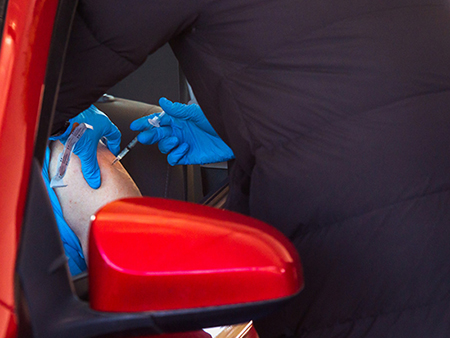 To schedule an appointment, visit UABMedicineVaccine.org, or call 205-975-1881 for assistance.
To schedule an appointment, visit UABMedicineVaccine.org, or call 205-975-1881 for assistance.
(Photography: Lexi Coon)The University of Alabama at Birmingham and UAB Medicine will open two drive-through COVID-19 vaccination locations this month, at the Hoover Metropolitan Complex on Sept. 15 and at Faith Chapel in Wylam on Sept. 22.
The Hoover Met location will operate Monday-Friday from 8 a.m-1 p.m. The Hoover Met is located at 5508 Stadium Trace Parkway, Hoover, AL 35244.
The Faith Chapel location will operate Monday-Thursday from 8 a.m.-1 p.m. Faith Chapel is located at 100 Mike Moore Blvd., Birmingham, AL 35244.
First, second and third doses of the COVID-19 vaccine will be offered free of charge to patients and the public in these drive-through locations, to help expand access to the vaccine and continue the fight against COVID-19.
To schedule an appointment, visit UABMedicineVaccine.org, or call 205-975-1881 for assistance. These sites also will accept those who drive up without an appointment.
UAB Medicine provides the FDA-approved Pfizer-BioNTech vaccine, now known as Comirnaty.
 First, second and third doses of the COVID-19 vaccine will be offered free of charge to patients and the public in these drive-through locations.
First, second and third doses of the COVID-19 vaccine will be offered free of charge to patients and the public in these drive-through locations.
(Photography: Lexi Coon)Currently, the Centers for Disease Control and Prevention recommends that moderately to severely immunocompromised people receive an additional (third) dose. This includes people who have:
- Medical conditions such as asplenia and chronic renal disease, which may be associated with varying degrees of immune deficiency
- Been receiving active cancer treatment for tumors or cancer of the blood
- Received an organ transplant and are taking medication to suppress the immune system
- Received a stem cell transplant within the last two years or are taking medication to suppress the immune system
- Moderate or severe primary immunodeficiency (such as DiGeorge syndrome or Wiskott-Aldrich syndrome)
- Advanced or untreated HIV infection
- Active treatment with high-dose corticosteroids or other drugs that may suppress immune response
Talk to your health care provider about your medical condition and whether an additional dose is appropriate for you.